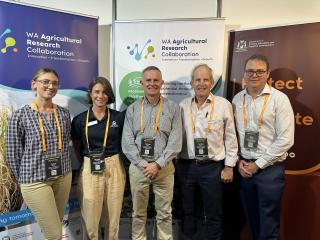The first ground-breaking project is set to begin under the WA Agricultural Research Collaboration, aimed at strengthening our State’s northern agriculture synergies and productivity across the cropping and cattle sectors.
The three-year Cropping Enabled Cattle project will explore the potential for Ord irrigated agriculture to support cattle-feeding systems in Western Australia’s north.
This $6 million initiative is a co-investment between the Collaboration and several partners, including the Cooperative Research Centre for Developing Northern Australia (CRCNA) and Cotton Research and Development Corporation (CRDC).
The project was co-designed by Collaboration partners including the Department of Primary Industries and Regional Development (DPIRD), CSIRO, Grower Group Alliance, and WA universities: Curtin, Edith Cowan, Murdoch and The University of Western Australia.
It is part of the Northern Agriculture program – one of six key research and development programs developed by the Collaboration including Grains Transformation, Climate Resilience, Agricultural Technologies, Aboriginal Participation and Capacity Building and Extension.
DPIRD Primary Industries Development Chief Scientist and WA Agricultural Research Collaboration spokesperson Ben Biddulph said it was an exciting milestone to see this first project come to life since the Collaboration’s launch last July.
“The Cropping Enabled Cattle project is a wonderful example of the Collaboration’s ‘Team WA’ approach to building research quality, capacity, careers and collaborations,” Dr Biddulph said.
“Our Collaboration partners and co-investors have worked together to design a project that will grow future beef production options in our State’s north.
“The project also seeks to strengthen research capabilities, through the creation of three new Kimberley-based roles and joint industry PhD appointment opportunities between DPIRD, CSIRO and the universities.”
Local cattle finishing systems will be examined using feed products generated from Ord irrigated crops including cotton meal and seed, maize and other grass silage.
Cattle backgrounding systems in the Ord region will also be tested, potentially including a sterile variety of the fodder tree leucaena.
Cropping Enabled Cattle is one of six projects funded through CRCNA’s broader Cotton, Grains and Cattle integrated production system program, which includes more than 30 research and funding partners.
CRCNA Chief Operations Officer Carla Keith said strong cross jurisdictional collaboration was at the heart of this transformational project, and the larger Cotton, Grains and Cattle program.
“We’ve partnered with the WA Agricultural Research Collaboration to examine how feed products from irrigated cropping can contribute to local cattle finishing systems to produce a ‘universally marketable animal’ and reduce the reliance on live export markets,” Ms Keith said.
“CRCNA has committed $1.45 million to this project to develop an integrated agricultural system that includes sustainable, adaptable cropping and cattle production benefits.”
 [1]
[1]Media contacts:
Megan Broad, DPIRD media liaison
(08) 9368 3137
